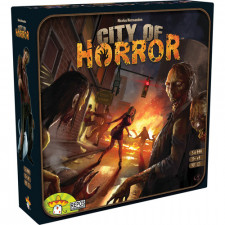City of Horror Review
on Oct 1, 2015
Many zombie-genre games attempt to create a façade of darkness by using a veneer of grim art and flavor text to carry narrative, but very few of them actually create the conditions for a truly dark experience. By dark, I don’t mean the faux darkness of rolling dice in a dark setting. I mean true darkness, where the reality that everyone has a dark side to their soul comes to light. City of Horrors absolutely embraces its darkness, and without relying on any hackneyed flavor text or “shocking†artwork to deliver it. This game’s theme is akin to a game of musical chairs, but the person left without a chair is thrown feet-first into a chipper. It’s sinister to the core, and it is a spectacular good time.
I will warn you, however, that this game is the polar opposite of the book “How to Win Friends and Influence People†because you will literally be pissing people off, making them hate you, and driving them to ruin you. Every single action you take in the game will be focused on increasing your character’s survival at the expense of others, complete with players pleading for their characters’ lives, bribery, and outright treachery through broken promises. The best part is that there is very little ‘gaminess’ in that you have only two goals: to find an antidote for each of your characters, and to survive. Sure, you can score some extra points for finding food, but the real goal is to kill off everyone else while being astute enough to not incur the wrath of your opponents so they will choose to vote for someone else to die. Very few games will have the entire table cheering when a pregnant lady is tossed from a water tower into the arms of the swarming undead, but in this game, you will not only cheer, you’ll be cheering ‘Two-fer’!
The beauty of this is that the rules are very light, and most of the “game†is found in the deliberate and premeditated screwing of your opponents through negotiation, prediction, and card play. Essentially, a round begins with all players tabling a secret movement card, followed by a simultaneous reveal. Then, a card is drawn, with zombies and items placed in certain locations. Next, each player moves one of their characters and starting with the first location through the sixth, they take the action associated with the location. The next bit is the best though, because that’s where the evil comes out: if there’s a zombie attack at a location, players who have a character there must vote on which person dies. Each character gets one vote, so if you have more characters at a location than the next guy, they’re probably going to be a snack for a zombie horde. Once that unpleasantness is done, the remaining characters get to vote on who will get to divide up any items on the location. It’s very simple, mechanically, which obscures the depth of strategy found in the game, which is created by the very clever voting system, pay-for-play special power system, and the use of cards.
Of all of the really smart design choices in the game, I think the one that I appreciate the most is the special power system. Each of the randomly-given characters has its own special power and victory point value, but when you use the power, you flip the character’s card to indicate that it’s exhausted, which prevents you from using it again, and that character’s value is halved. Because of this, you’re faced with the difficult choice of using the characters’ powers, knowing that if they survive, they will be less valuable. Even worse, you will likely be sacrificing some of your characters at one point or another via negotiation so that others might survive. Yes, you very likely will literally be tossing that pregnant lady off of the water tower so that your sushi chef will survive, earning you more points.
Every mechanic in the game is refined to the point of laser-beam precision, and there really is very little “chrome†built into the game to make it appear more interesting; it doesn’t need ancillary garbage to make it a great game. Every decision you make is crucial, and because you will only be moving four pawns from their starting location throughout the game, the decisions really surround when and where to make or break deals, who to target, and when to use your characters’ special powers or your hand of cards. In the end, this game is simply fantastic, albeit not for everyone, and this game has gained an honored position on my Forever Shelf because it does what games like Diplomacy do, but faster, cleaner, better, and meaner. I highly recommend it to anyone who enjoys utterly cut-throat games and want a game that delivers a strong narrative without doing so by holding your hand via flavor text and artwork.

 Customer Support
Customer Support  Subscribe
Subscribe 




 Account
Account  Wishlist
Wishlist 

